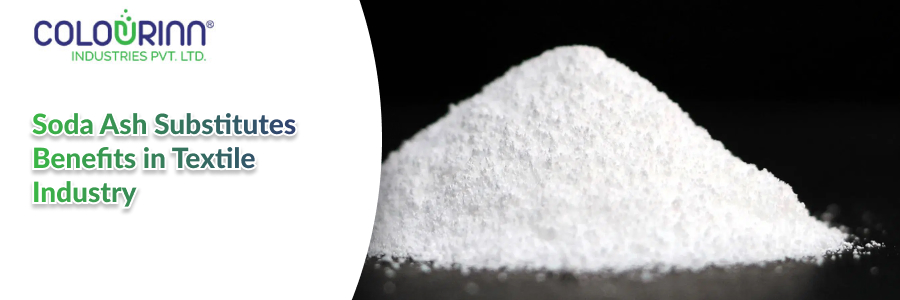The search for more economical and environmentally friendly dying techniques is essential in the textile sector. Although soda ash has long been required to guarantee that colors bind properly to cloth, the industry is moving towards alternatives due to its negative environmental and economic effects.
Soda ash substitutes are now being investigated for similar benefits at lower environmental and financial costs. It describes how these substitutes are promoting sustainable textile manufacturing.
The Role of Soda Ash
Soda ash is sodium carbonate used in textiles to adjust pH levels during dyeing. His function is primarily to help attach the dye to fabric for strong color fastness. But rising soda ash prices and environmental impact mean alternatives are being looked at that promise similar benefits.
Soda Ash Uses
Soda ash substitutes have applications in all textile production steps:
- Pretreatment: Proper pH levels are maintained before dyeing fabrics with substitutes.
- Dyeing: They improve color absorption and reduce dye waste during dyeing.
- Fixation: Substitutes help set the dye so colors stay vibrant even after several washes.
- Finishing: The last stages add softness and feel to the fabric.
With sustainability becoming a concern, more and more companies are switching to alternatives for soda ash lights. Besides environmental benefits, industry leaders have reported improved fabric quality and cost savings as additional benefits of these alternatives.
Curious about the work of dispersing dyes in polyester carrier dyeing? Ideal for textile professionals wanting to learn more about dyeing techniques. Learn more about the Polyester Carrier Dyeing Process Using Differentiate Dyes in this article.
Types of Soda Ash Substitutes
The market provides various soda ash substitutes that have different properties:
- Sodium Silicate: It substitutes sand and provides good dye fixation. Known for being environmentally friendly and economically viable.
- Sodium Bicarbonate (Baking Soda): This simple household item can be a mild substitute. This material is used in the pretreatment and finishing processes.
- Potassium Carbonate: The superior dye absorption makes it an ideal substitute for natural fibres.
- Sodium Acetate: It is a low-cost dye derived from acetic acid.
- Sodium Citrate: It’s mild and good for fabrics and natural dyes.
Find out what additives can do – from increasing dye uptake to ensuring even coloration. Learn about 10 Useful Applications of Penetrating Agents in the Textile Industry.
Benefits of Soda Ash Substitutes
Soda ash substitutes bring many advantages to the textile industry in addition to solving problems associated with traditional soda ash. The benefits are numerous:
- Environmental Stewardship
The greenest reason to use substitutes is their convenience. Some alternatives, like sodium silicate and sodium citrate, are obtained from nature and thus reduce the environmental impact of textile production. Such substitutes reduce water pollution and ecological damage. They can be used by manufacturers for a greener, more responsible industry.
- Cost-Effectiveness
Often market-driven, the price of soda ash affects production costs. Sodium carbonate substitutes are a stable but less expensive solution. For instance, baking soda and sodium acetate are both readily available and inexpensive alternatives. For large textile manufacturers, this cost-effectiveness is especially advantageous for financial planning and resource allocation.
- Superior Performance
In some applications, some substitutes perform better than sodium carbonate. In particular, potassium carbonate absorbs dyes better than most other materials. It is a mild salt that is good for delicate fabrics because it maintains fabric integrity while producing beautiful colors. These performance enhancements directly affect the final textile product quality.
- Versatility in Applications
Sodium carbonate substitutes are applicable to many textile materials. Such alternatives may work for natural fibres like cotton and silk or synthetic ones like nylon and polyester. This versatility enables manufacturers to use one substitute for different production lines, simplifying processes and saving costs.
- Gentle on Fabrics
A few mild substitutes are sodium citrate and sodium bicarbonate. Such gentle substitutes are less corrosive and will not harm fabric. They are particularly useful in soft textiles to preserve their texture and quality. With such substitutes, manufacturers can produce fabrics that remain soft and fluffy to customers.
- Long-Term Sustainability
Sodium carbonate substitutes contribute to textile industry sustainability beyond immediate benefits. Reducing soda ash use can also lower environmental and financial costs for manufacturers. That leads to a more resilient and eco-conscious industry in line with global sustainability targets.
- Innovation Opportunities
Explore substitutes for ideas. Manufacturers trying different alternatives might find new processes and applications. Such unique textile treatments and dyeing techniques may develop. Accepting substitutes promotes innovation in the industry.
- Customer Satisfaction
Sodium carbonate substitutes ultimately improve customer satisfaction. Superior quality bright colors, / soft fabrics mean products that meet or exceed customer expectations. Manufacturers can earn customer loyalty and market success by being excellent.
Conclusion: Partnering with Colourinn for Sustainable Solutions
At Coloruinn we acknowledge the important role of a range of chemicals in the textile industry, and we at Colourinn understand this. With an eye toward the future, our Soda Ash substitutes offer the perfect balance of environmental responsibility, efficiency, and quality. Browse a few of our diverse products and help us redefine textile manufacturing for a more sustainable future.
Frequently Asked Questions
Q1. What are soda ash substitutes?
A. Soda ash substitutes are chemical alternatives to sodium carbonate (soda ash) used in textile dyeing and printing processes. These substitutes help adjust the pH of the dyeing solution to allow reactive dyes to bond effectively with the fibres.
Q2. Why use a soda ash substitute?
A. Some textile manufacturers or hobbyists may prefer a soda ash substitute due to environmental, safety, or cost reasons. Certain substitutes, like baking soda or potassium carbonate, may be gentler or easier to source for small-scale dyeing projects.
Q3. Are soda ash substitutes eco-friendly?
A. Some substitutes, like baking soda, are generally more eco-friendly than soda ash. However, others, like TSP, can be harmful to the environment. Always consider the environmental impact and proper disposal methods when selecting a substitute.

